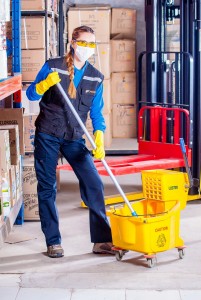 Maintaining high levels of hygiene should be an essential element of how any workplace operates. As an employer, the Health and Safety at Work Act 1974 requires you to have a general duty to ensure the health, safety and welfare of all your employees, so far as is ‘reasonably practical.’
Maintaining high levels of hygiene should be an essential element of how any workplace operates. As an employer, the Health and Safety at Work Act 1974 requires you to have a general duty to ensure the health, safety and welfare of all your employees, so far as is ‘reasonably practical.’
The issue of hygiene is a part of this legislation, so you need to be sure you are providing the facilities and information for your employees to create a hygienic and clean workplace.
Why is workplace hygiene important?
There are potential dangers for any workplace if there is little or no emphasis on why hygiene is important. Primary among these risks is the possibility of infection, whether it’s through poor personal hygiene, slapdash office cleaning or badly managed washroom facilities. You can prevent many of these problems by having a strategy for maintaining a hygienic workplace.
Personal hygiene
This refers to the habits, cleanliness and appearance of your employees. It can be a sensitive area for employers and managers, so an official policy can diffuse any awkwardness by setting down exactly what is expected from everyone. Depending on your business, there may be options to provide shower facilities if employees exercise before work or rely on a bike for transport, and you can ask that hair washing and grooming facial hair is a part of usual personal hygiene for work. Hand washing and the use of hand sanitisers are also key tools to help prevent the spread of illness.
Washroom facilities
Your policy on hygiene requirements should ensure that washrooms equipped with running cold and hot water are provided for all employees. You should also provide hand soap, toilet paper and towels for drying hands. This allows employees to attend to their personal hygiene when they have finished using the facilities. If you contract the cleaning of toilets and washrooms to an outside agency, you should be clear about the levels of cleanliness you require and how often cleaning should be done.
Kitchen
Kitchens can be a health risk if proper cleanliness is not observed. Any area where food is prepared or hot drinks are made should have a high level of cleaning, including preparation surfaces, utensils and cups, mugs, plates and cutlery, where provided. Your employees are entitled to complain if they consider there is a health risk through poor maintenance and cleaning of the kitchen area, but you can also encourage them to take responsibility to protect themselves and practice a good hygiene regime.
Office cleanliness
Employees should be encouraged to be responsible for cleaning and maintaining their own work areas or workstation. This can be part of your hygiene policy so everyone is aware of it and agrees with it. Surfaces can be cleaned with disinfectant to reduce the possibility of bacterial infection, and desks should be kept tidy and as clutter-free as possible. If employees have individual bins, it’s important to ensure these are emptied on a daily basis.
Good hygiene makes good sense
When your employees are aware of why it is important to have a hygienic workplace, they are more likely to follow your policy guidelines and create a pleasant and safe environment in which to do their jobs. If everyone is vigilant, sickness levels in the workplace can be significantly reduced.
Contact us should you require assistance.